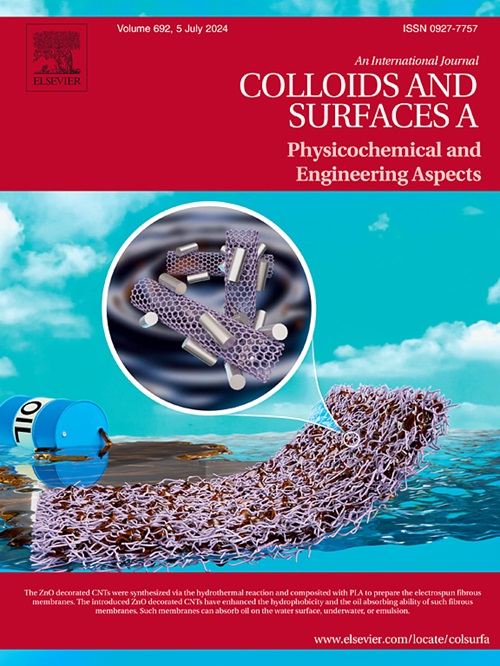木质素衍生酚类单体阻水分散性异氰酸酯的合成及交联应用
IF 5.4
2区 化学
Q2 CHEMISTRY, PHYSICAL
Colloids and Surfaces A: Physicochemical and Engineering Aspects
Pub Date : 2025-04-17
DOI:10.1016/j.colsurfa.2025.136963
引用次数: 0
摘要
水性胶粘剂广泛应用于木材加工工业领域。反应性异氰酸酯交联剂的加入是提高水性胶粘剂性能的关键,而反应剧烈且不均匀会导致操作周期短,产品质量不可控。在此,本研究提出了一种绿色低温阻断异氰酸酯来解决这一问题。通过密度泛函理论(DFT)计算和实验验证,选择香兰素作为木质素衍生酚类单体的低温解封剂(130℃)。以香兰素和HDI三聚体为原料,成功地制备了一种新型的水分散封闭型异氰酸酯(WDBI)乳液。通过外观、粒径和zeta电位分析对WDBI的性能进行了评价,结果表明,WDBI-1 (R=1:0.7)和WDBI-2 (R=1:0.8)具有良好的分散性和4个月以上的储存稳定性。以WDBI乳剂为交联剂,与白乳胶(EVA)配制水基复合胶粘剂,最大使用寿命为7 d。使用复合胶粘剂制造的胶合板样品显示出增强的粘合强度,特别是湿强度。胶合板的最大湿强度为1.28 MPa,超过中国国家标准(GB/T 9846-2015)。本研究证实了水分散型阻块异氰酸酯(WDBI)的低温脱块性能,可用于配制高性能水基胶粘剂,实现人造板的清洁绿色生产。本文章由计算机程序翻译,如有差异,请以英文原文为准。
Synthesis and crosslinking applications of a lignin-derived phenolic monomer-blocked water-dispersible isocyanate
Water-based adhesives are extensively used in the field of wood processing industry. The addition of crosslinking agents based on reactive isocyanates is key to improving the performance of water-based adhesives, while intense and non-uniform reactions can lead to short operation periods and uncontrollable product quality. Herein, this study proposes a green and low-temperature deblocking blocked isocyanate to address this issue. Through Density Functional Theory (DFT) calculations and experimental validation, vanillin was selected as a low-temperature deblocking agent (130 ℃) from lignin-derived phenolic monomers. A novel water-dispersible blocked isocyanate (WDBI) emulsion was successfully prepared using vanillin and HDI trimer. The performance of WDBI, evaluated through appearance, particle size, and zeta potential analyses, showed that WDBI-1 (R=1:0.7) and WDBI-2 (R=1:0.8) achieved good dispersibility and storage stability for over four months. The WDBI emulsions were used as crosslinking agents to formulate water-based composite adhesives with the white latex (EVA), reaching maximal pot life of 7 days. The plywood specimens manufactured using the composite adhesive showed enhanced bonding strength, particularly for wet strength. The maximum wet strength of the plywood was 1.28 MPa, exceeding the Chinese national standard (GB/T 9846–2015).This study confirmed the low-temperature deblocking performance of water-dispersible blocked isocyanate (WDBI), which can be used to formulate high-performance water-based adhesives for clean and green production of Wood-based panel.
求助全文
通过发布文献求助,成功后即可免费获取论文全文。
去求助
来源期刊
CiteScore
8.70
自引率
9.60%
发文量
2421
审稿时长
56 days
期刊介绍:
Colloids and Surfaces A: Physicochemical and Engineering Aspects is an international journal devoted to the science underlying applications of colloids and interfacial phenomena.
The journal aims at publishing high quality research papers featuring new materials or new insights into the role of colloid and interface science in (for example) food, energy, minerals processing, pharmaceuticals or the environment.

 求助内容:
求助内容: 应助结果提醒方式:
应助结果提醒方式:


